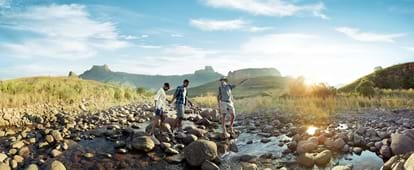By creating an account, I agree to the
Terms of service and Privacy policy
Choose your country and language:
Africa
Americas
Asia Pacific
Europe
OOn theAmphitheatre SlackpackerTrail in the DrakensbergMountains (or uKhahlamba, as the range is known in isiZulu), you will find yourself at the top of the highest waterfall in Africa, drinkingin unforgettable views. In days gone by,this route would have been restricted to the most seasoned hikers, but now professional guides assist visitors all the way.However, while guided tours and porters make it possible for those of average fitness to tackle the Amphitheatre SlackpackerTrail, you’ll still need plenty of perseverance and stamina to conquer the 1 200m ascent, which takeyoutothe Roof of Africa.‘This is one of the most popular of the uKhahlamba-Drakensberghikes,’says Sarah Drew, who specialises in guided hikes in the area.The Amphitheatre, she explains, is a massive rock wall, creating one of the most dramatic features in the Drakensberg range: ‘It rises 1000m from the Tugela Valley, extending for5km from Eastern Buttress to Sentinel Peak.’The Amphitheatre Slackpacker Trail spans Free Stateprovince, KwaZulu-Natal and neighbouring state Lesotho, and the most popular option is to do 25km to 30km over 3days.Hiking through grasslands and indigenous yellowwood forests, visitors have the chance to see plenty of wildlife, including eland, mountain reedbuck, baboons and endemic birds such as the Drakensberg rockjumper.

TThe route includes the famous chain ladders – 2 sections, of 40m and 20m, solidly bolted into the rock – which visitors climb to get to the top of the escarpment, also known as the Roof of Africa.
Here you will find the source of the Tugela Falls, which plunge 948m over the face of the Amphitheatre down to Royal Natal Park below. If the chain ladders are not for you, there is an alternative option of hiking up a gully to get to the top. Experienced trail guides pace the hike according to fitness levels, with refuel and rest stops along the way.
For those who want to rough it, guides can organise an alternative route with caves in which visitors can stay overnight. For those who prefer comfort, there are inviting tented camps and lodges along the hike, offering delicious food, a hot bath and a comfortable bed at the end of each day.
Even better news, for those who don’t feel fit enough for the challenges of the Amphitheatre (even ‘slackpacker’ style, with someone else transporting you main pack), is that there are any number of hikes available in this part of the world, some suitable for the super-fit, others for the moderately fit, and even walks for the not-fit-at-all. Consult the Active Escapes website to see your options.
TTravel tips & Planning info
Who to contact
Active Escapes
Tel: +27 (0)33 329 5259 or +27 (0)84 240 7277 (Sarah Drew)
Email: sarah@active-escapes.co.za
How to get there
Drive from Johannesburg (via the N3 to Warden and then the R714), Durban (via the N3 to Harrismith, then the N5 and R57) or Bloemfontein (via the N1, N5 and R57), all of which are about 350km from Witsieshoek – one of the starting points of the hike. The drive from each of these cities will take about 4 hours.
Best time to visit
All year round. In summer it is wise to make the most of the mornings, on the assumption that the afternoons will be wet. Days are shorter in winter, but the weather is more stable and the whole day can usually be used for hiking. Spring, summer and early autumn (September to April) are the best months for wildflowers.
Around the area
The Drakensberg is an adventurer’s haven, with a choice of exciting hikes, horse and mountain bike trails and wonderful places to stay.
What will it cost?
Prices vary, depending on the hike you choose, the overnight accommodations you opt for and the size of the party – budget on between R3 900 and R5 500 per person for the Amphitheatre Slackpacking Trail, but consult the listed website.
Length of stay
The Amphitheatre Slackpacking Trail takes 3 days, but it is such a beautiful area you’ll want to spend a week in the region if you can.
What to pack
Hiking clothes and boots, good socks, rain jackets, thermal underwear, a hat and sunscreen. Your hike organiser will tell you exactly what you need.
Where to stay
There are lodges, tented camps and backpackers along the way. If sleeping in caves is your thing, this can be arranged with your hike organiser.
What to eat
The guided hikes are fully catered, but it’s always good to pack a few of your own snacks to nibble along the way.
Related links

